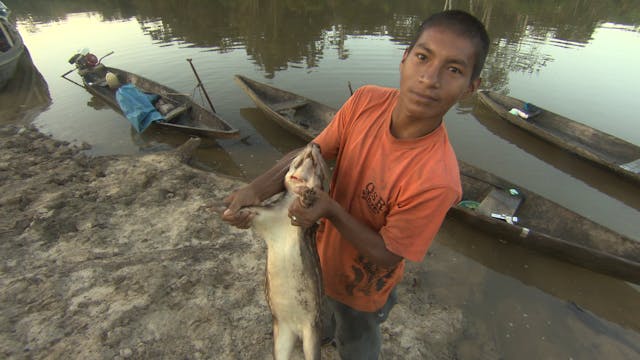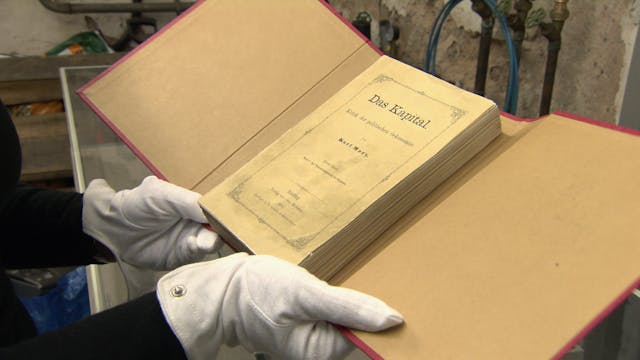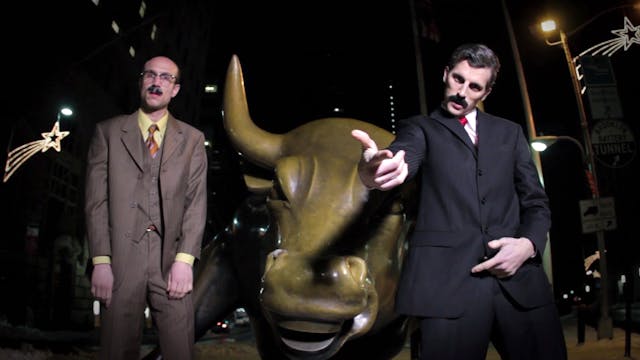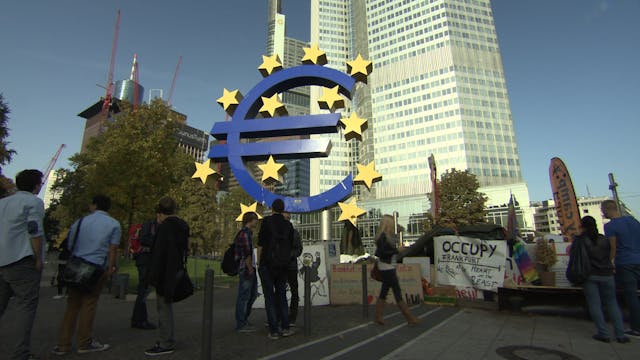-
CAPITALISM: A six-part series
320 minutes / 7-day rental
Capitalism has been the engine of unprecedented economic growth and social transformation. With the fall of the communist states and the triumph of "neo- liberalism," capitalism is by far the world's dominant ideology. But how much do we understand about how it originated, and what makes it work?
CAPITALISM is an ambitious and accessible six-part documentary series that looks at both the history of ideas and the social forces that have shaped the capitalist world.
Blending interviews with some of the world's great historians, economists, anthropologists, and social critics (view the complete list of participants), with on-the-ground footage shot in twenty-two countries, CAPITALISM questions the myth of the unfettered free market, explores the nature of debt and commodities, and retraces some of the great economic debates of the last 200 years.
Each fifty-two minute episode is designed to stand alone, making these ideal for classroom use or as an additional resource for students:
Episode 1: Adam Smith, The Birth of the Free Market
Capitalism is much more complex than the vision Adam Smith laid out in The Wealth of Nations. Indeed, it predates Smith by centuries and took root in the practices of colonialism and the slave trade.Episode 2: The Wealth of Nations: A New Gospel?
Adam Smith was both economist and moral philosopher. But his work on morality is largely forgotten, leading to tragic distortions that have shaped our global economic system.Episode 3: Ricardo and Malthus: Did You Say Freedom?
The roots of today's global trade agreements lie in the work of stockbroker David Ricardo and demographer Thomas Malthus. Together, they would restructure society in the image of the market.Episode 4: What If Marx Was Right?
Have we gotten Marx wrong by focusing on the Communist Manifesto instead of on his critique of how capitalism works - a critique that is relevant and as penetrating as ever?Episode 5: Keynes vs Hayek: A Fake Debate?
The ideological divide between the philosophies of John Maynard Keynes and Friedrich Hayek has dominated economics for nearly a century. Is it time for the pendulum to swing back to Keynes? Or do we need a whole new approach that goes beyond this dualism?Episode 6: Karl Polanyi, The Human Factor
An exploration of the life and work of Karl Polanyi, who sought to reintegrate society and economy. Could the commodification of labour and money ultimately be as disastrous as floods, drought and earthquakes?CAPITALISM is an impressive series that makes economics accessible through an interdisciplinary approach that explores the work of great thinkers, while embedding economics in specific social, political, and historical contexts. The series can be watched as a whole, but each episode also stands alone.
The series features some of the world's top economists, historians, anthropologists, and sociologists, including Thomas Piketty, Noam Chomsky, Yanis Varoufakis, Nicholas Phillipson, Kari Polanyi Levitt, David Graeber, and Abraham Rotstein.
"A captivating epic... a major contribution to economic and social reflection." —Le Monde (France)
"Brings clarity to confusion, makes complexities accessible, and produces a clear narrative of a system that seems opaque to most people." —Journal du Dimanche (France)
"Masterly... is going to revolutionize our vision of the economic world." —La Vie (France)
"In first look CAPITALISM seems like the economics class you should have skipped.... but in a second look CAPITALISM is the seminar that you must take in the second semester ... the point of view is very different and surprising, the result is an impressive, visually rich series.” —Israel HaYom (Israel)
"Should not be missed! Combines highly educational explanations of concepts, economic history and contemporary life, to create a series of documentaries, each of which it is difficult to stop watching!" —Alternatives Economiques (France)
"10 Stars! A truly captivating series that delves into history, philosophy, investigates four corners of the planet, and stimulates the viewer with a re-examination of the basic concepts that define our lives." —Globes (Israel)
The series was chosen as one of the ten best programs in France in 2014.
-
CAPITALISM Episode 1: Adam Smith, The Birth of the Free Market
53 minutes / 3-day rental
"The magical circle of investment and conquest... begins with the discovery of the Americas. This is the engine of two wheels: the wheel of scientific discoveries and the wheel of capitalist economy. Credit, investment, profits. More credit, more investment, more profits." —Historian Yuval Noah Harari
How did capitalism develop? For centuries, the standard formulation - laid out by Adam Smith in The Wealth of Nations and repeated uncritically ever since - has gone like this: humans used to trade and barter, but as society became increasingly complex, barter became harder to manage and money developed.
The trouble is that - like the story of Columbus discovering America - everything about this classical formulation is wrong.
This episode explores the origins of capitalism, arguing that it is inextricably linked to colonialism, the rise of science, and the slave trade. Capitalism preceded Smith by centuries - the plantations of the West Indies were purely capitalist enterprises, as were the privately-funded expeditions that colonized much of the world. Like today's startups, these ventures offered high risk but huge rewards to those that succeeded.
On a journey covering four continents and nearly a millennium, we discover the flourishing free market of 12th-century China, learn how the economics of indigenous societies differed vastly from their portrayal by Smith, and come to understand how the European "discovery" of America fuelled a scientific boom that was integral to colonization and economic exploitation - creating a global capitalist boom that was felt from the streets of China, to the slave castles of West Africa, the markets of Spain and the pastures of England.
Featuring historian and Smith biographer Nicholas Phillipson, economist Kari Polanyi Levitt, historian Yuval Noah Harari, and others.
-
CAPITALISM Episode 2: The Wealth of Nations: A New Gospel?
53 minutes / 3-day rental
Adam Smith published two books in his life. The Wealth of Nations is a global bestseller that has never been out of print, while The Theory of Moral Sentiments is largely forgotten.
This episode of CAPITALISM argues that disconnecting Smith the economist from Smith the moral philosopher has led to tragic distortions that have profoundly shaped our global economic system.
Divided into easy-to-use sections on the division of labor, self-interest, and the tyranny of control, THE WEALTH OF NATIONS: A NEW GOSPEL lays bare the moral dilemma at the heart of The Wealth of Nations: the human cost of achieving a purely efficient free market system.
This episode convincingly argues that the intellectual foundations of current market economics are largely based on a misinterpretation of Smith's words. It argues that Smith did not favour a completely unregulated free market - in fact, he thought it would be disastrous - and that the underpinnings of contemporary capitalism lie instead in an ideology born in the 19th century, that privileges greed over other equally deep-seated human drives.
Featuring interviews with Noam Chomsky, economist Ha-Joon Chang, and Smith biographer Nicholas Phillipson, among others - as well as archival footage of free market luminaries such as Ayn Rand and Milton Friedman.
-
CAPITALISM Episode 3: Ricardo and Malthus: Did You Say Freedom?
53 minutes / 3-day rental
"To see weeds grow where we used to build things that were in every General Motors vehicle is just terrible." —Art Reyes, electrician and former GM employee, Flint, Michigan
In Flint, Michigan, a weed-strewn lot is all that's left of a factory that once employed over 10,000 people. In Haiti, cheap subsidized American rice has flooded the market, forcing local producers out of business and into the capital, Port-au-Prince, where they struggle to find work. In Ghana, the International Monetary Fund's "structural adjustment" has meant selling public assets to foreign investors and a market flooded with cheap imports.
All of these events can be traced back to the thinking of two men born in the 18th century: David Ricardo and Thomas Malthus.
Ricardo was a stockbroker who developed the notion of comparative advantage: that countries should specialize and meet each other's needs through trade. Malthus was the demographer who feared a population explosion would cause the world to run out of food by 1890, and worked with Ricardo to eliminate public assistance for the poor in order to create a mobile and motivated workforce.
Together, they would restructure society in the image of the market. But the origins of international trade are far from free. They involved heavy subsidies, market protection, and the barrels of guns pointed at recalcitrant nations.
Featuring economics superstar Thomas Piketty, former WTO Director-General Pascal Lamie, former IMF chief economist Simon Johnson, sociologist David Graeber, and others.
-
CAPITALISM Episode 4: What If Marx Was Right?
53 minutes / 3-day rental
"Paradoxically, we can't really learn that much about socialism or communism or the future from Marx. We can learn a great deal about how capital works." —Marx historian David Harvey
When the communist systems of the 20th century crumbled, many thought that was the end for Karl Marx as a serious thinker too. But the last few years have seen a reawakening of interest in Marx's work - in particular for his analysis of the nature of capital and the forces it unleashes.
Concentrating on commodification, alienation, and the fetishization of money and credit, WHAT IF MARX WAS RIGHT argues that Marx is more relevant now than he has been in nearly a century. Have we gotten Marx wrong by focusing on the Communist Manifesto instead of on his still-cogent critique of how capitalism works?
Featuring former Greek finance minister Yanis Varoufakis, small farm activist Vandana Shiva, economist Thomas Piketty and Marx experts Mary Gabriel and David Harvey, among others.
-
CAPITALISM Episode 5: Keynes vs Hayek: A Fake Debate?
53 minutes / 3-day rental
"The idea of freedom is great for those who have large reserves of credit... Contracts between equals are rare things in capitalism." —Economist Robert Boyer
For nearly a century, most economic debate in capitalist societies has come down to a battle royal between two camps: those following John Maynard Keynes and those whose allegiance lies with Friedrich Hayek. Or, in other words, the ideological divide between those who see the need for economic policy to serve social cohesion and stability, and those for whom price - as set by the free market - is the only guide to rational economic decisions.
KEYNES VS HAYEK: A FAKE DEBATE? Delves deeply into the origins of both schools of thought, and how they were shaped by post-WWI German reparations, the Depression, and the need to rebuild industrial economies after World War II.
Keynesians ruled the day in the post-war economic expansion, but the soaring crime rates and economic stagnation of the 1970s rekindled interest in the idea that the government could not successfully guide the economy. This was the moment at which uber-Hayekian economist Milton Friedman emerged from obscurity, influencing the neo-conservative governments of Ronald Reagan and Margaret Thatcher, and leading to an economic revolution whose hallmarks - privatization and deregulation - continue to be felt today.
Is it time for the pendulum to swing back to Keynes? Or do we need a whole new approach that goes beyond the dualism of Keynes vs Hayek?
Featuring Keynes biographer Robert Skidelsky, Hayek biographer Alan Ebenstein, and economist James Kenneth Galbraith, among others.
-
CAPITALISM Episode 6: Karl Polanyi, The Human Factor
53 minutes / 3-day rental
"The economy is important but it cannot override and colonize, if you wish, all other aspects of our social life and our society." —Economist Kari Polanyi Levitt
Karl Polanyi's life's work was to reintegrate society and economy - with the latter serving the former.
Taking us on a journey from ancient Sumeria to the towers of Frankfurt, this episode of CAPITALISM argues that commercial transactions have always been embedded in social norms, and that a self-regulating market economy is in no way a natural state of human affairs. The thought of political economist Karl Polanyi, author of The Great Transformation, is central to this exploration.
Polanyi said that industrialization and the first wave of globalized economy had led to labor, money and nature being treated like commodities, with potentially disastrous results - the kind being played out on the streets of Athens, where unemployment is over 20%, neo-fascism is on the rise, and rioters face down police over harsh austerity measures that benefit foreign bankers.
Debt levels around the world are rising, and the webs of who owns whose debt are becoming ever more complex. Could the commodification of money ultimately be as disastrous - both for individuals and businesses - as floods, drought and earthquakes?
Featuring economist Kari Polanyi Levitt, political economist Abraham Rotstein, former German foreign minister Joschka Fischer, and former Greek finance minister Yanis Varoufakis, among others.









